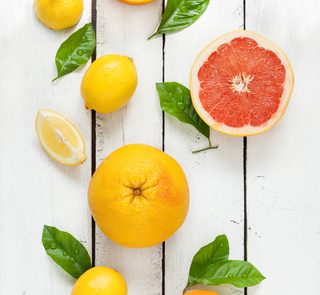You’re feeling… Down
When life is getting on top of you, willpower is at an all time low so it’s that bit harder to refuse foodie treats and booze, let alone get to the gym. But we all know that comfort food is not the answer – instead you’ve got to get out of the rut.
What you really need…
Break the cycle and start with small changes to your diet. The right choices can lift your mood and get you on the right track. “Serotonin is a feel-good hormone, so when you eat foods that boost this your mood can improve dramatically,” says top hypnotherapist, psychologist and author Marisa Peer (marisapeer.com) whose client list includes celebrities, royalty and Olympic athletes. “Many anti-depressents do the same thing: they try to get your body to hold on to serotonin. But instead of doing it artificially with drugs, it’s completely safe – and far nicer – to replenish it in your body through food. Top sources include eggs, avocados, bananas, dates, dark chocolate, poultry, celery, pears and coriander – enjoy these in your diet regularly for a steady supply of serotonin.”
Don’t forget that exercise triggers the release of endorphins in your body, making you feel great, so it’s even more important to make the effort to get active when you’re feeling low. Do whatever workout you most enjoy. Master trainer at 1Rebel and spokesperson for pinkparcel.co.uk Esmee Gummer suggests getting tough: “For an extra release, try boxing – there’s nothing better than beating a bag down and feeling all your troubles melt away.”
You’re feeling… Negative
If your weight loss and fitness has hit a plateau it can feel as if you’re never going to have a body you can be proud of. You want to wallow in self-pity.
What you really need…
…is a plan! Superdrug’s nutritionist Charlotte Stirling-Reed (superdrug.com) has the following advice for firing up your diet motivation and making your glass half full again: “This is about you and your goals, so don’t compare yourself to anyone else. Reflect on what’s working for you and what isn’t. Write down your new plans and targets so you can refer back to them. Remember that small steps towards big changes are often the most successful. Try enlisting the support of a friend to increase your motivation and staying power. It’s also a good idea to plan your meals ahead of time to help you stay in control. A food diary is a great way to keep on track, but don’t guilt trip yourself if you slip up and remember that everyone makes mistakes. Think about the 80:20 rule and aim to eat well most of the time.”
You’re feeling… Stressed
Work is getting on top of you, and the only option is to work through lunch and skip your evening fitness class because you’re so time-strapped.
What you really need…
Working out is a brilliant way to kick stress, particularly if you go alfresco. Just a 10-minute stroll through the park can be enough to beat tension and recharge your batteries. Researchers at Glasgow Univeristy found that exercising outside among trees and grass lowered anxiety levels by as much as 50 percent.
Stressful times can lead us to either over- or under-eat. But eating well will actually help you chill out, and it doesn’t have to be time-consuming. “Protein is vital for every cell to perform inside our body, to function, concentrate, combat stress, recover and replenish,” says Rhiannon Lambert, MissFits nutrition ambassador (missfitsnutrition.com). “We require 0.8-1g of protein per kg of body weight, so think eggs, fish, chicken, nuts, beans and pulses. Protein powders are also useful when you’re on-the-go. Other essential nutrients to beat stress include: omega 3 fatty acids, which salmon is a good source of; zinc, found in nuts, spinach and lamb; and magnesium, in dark leafy greens.”
You’re feeling… Hungry
It might only be 11am, and even though you had a big bowl of porridge for breakfast, your midday meal can’t come soon enough. Hmm, cake now, then cheese baguette or burger and chips for lunch?
What you really need…
Even when you’re on a diet, it can pay to listen to your body. “Sometimes, our cravings are our body’s way of telling us that we are missing key nutrients,” says Frida Harju, nutritionist at the health app Lifesum (lifesum.com). “For instance, if you find yourself hankering for cheese, your body might need calcium.” So it’s true that a little of what you fancy does you good! Sadly, that doesn’t give you free-reign to binge in the food court. “Most of the time when you crave fat and refined carbs it’s because your energy levels are low and your body knows that foods with a high-GI will give you energy quickly. Your brain associates fatty foods with quick energy bursts, which can activate its reward centre,” Frida warns. So, avoid the blood sugar rollercoaster by opting for low-GI carbs from wholegrains and include lean protein in your meals to help you feel fuller for longer.
And it’s not only about what you eat, but how you eat it, according to research from the University of California, which revealed that mindful munching can boost weight loss for dieters. It makes sense really, if you enjoy your food away from distractions like TVs, computers, phones and slow down to savour every bite, you’re more likely to chew properly – which aids digestion – and stop eating when you’re full.
You’re feeling… Tired
Need coffee now, even though you’re getting decent kip most nights?’
What you really need…
Well, it’s not another coffee! Even though it supplies a short term fix, you’ll soon come crashing down from that caffeine buzz, making you feel worse.
If you’ve recently upped your workouts, perhaps you’re overtraining. “While the aim of exercise is to push your body to fatigue, there’s a tipping point. If you take the intensity and frequency too far and don’t allow for recovery, you’re putting yourself at risk,” warns Steve Tansey, head of research and development and trainer at Les Mills UK (lesmills.com/uk).
So how do we avoid overdoing it? “Listen to your body, include rest days and complement your hard-core training sessions with restorative options like yoga, walking or short jogs. Make a training diary to record when you exercise and how you feel afterwards,” Steve suggests.
“And, high intensity interval training (HIIT) is a great way to get results quickly, but beginners should up the intensity slowly and not do more than three HIIT sessions per week.”
On the flip side, if your workouts have been put on the back burner of late, picking it up again should actually give your energy levels a lift. Even though exercising tends to be the last thing you feel like doing when you’re knackered, research shows it’s better at boosting your vigour than a nap or stimulants. In fact, a study published in Psychological Bulletin analysed the results of more than 70 studies on exercise and fatigue and found that in more than 90 percent of cases working out increases energy and reduces tiredness.



















